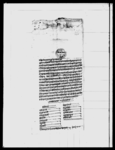A rukkā of the king directing twelve families of Māsau and Kimāḍi villages to operate a hulāka (VS 1864)
ID: DNA_0013_0062
Edited and
translated by Manik Bajracharya
Created: 2019-05-21;
Last modified: 2020-01-22
For the metadata of the document, click here
The accompanying edition, translation/synopsis and/or commentary are available under the terms of the Creative Commons Attribution-ShareAlike 4.0 International License
Abstract
This rukkā of King Gīrvāṇayuddha Vikrama Śāha directs twelve families of Māsau and Kimāḍi villages to operate a hulāka and provides them jāgīras in return.Diplomatic edition
[1r]
श्रीदुर्गाज्यू\[royal seal]1स्वस्तिश्रीमन्महाराजाधिराजकस्यरुक्का¯¯ ¯¯ ¯¯ ¯¯ ¯¯ ¯¯ ¯¯2आगेगढ़कोमासौ⟪मा⟫चिठिपत्रञाहाँवाटगयाकोपश्चिमवाटआय़ाका
3तपसीलवमोजिमकाघरलेमासौमाजना४चारलेआठौप्रहररुजु
4रहिचिठिपत्रकोहुलाकचलाउनुषटाय़ावमोजिमकाहुलाकिलाईआ
5फुवस्याकोघरवारिजिमिकोअम्वालिलेषोसमोसनगर्नु•गर्षासरह
6कोरकमकलमकोतिमिहरूलेसालवसालतिर्यामध्येघर१केदर
7रूपैया१येकर•फागुआनादुई//दुवैकलमकोज्मारूपैया१//
8अरूझारावैकरवेठवेगारमाफऔहुलाककोकाजकाये़मरहंज्याल
9समवर्स्याईनीचासकोपालोवाहिकसाल६०देषीपुढ़ोकोव़ये़रान
10जिमिमध्येघर१केदरजागिरविसी२गरिवक्स्यौंलालमोहरचिठिपत्र
11कोहुलाकचलाउनुअरूआउन्याजान्यावाटमाहिडन्याकोवोझाभा
12रिचिठिपत्रकाहुलाकीलेनवोकनु•कसैलेजवरदस्तीगरिवोझाभारि
13वोकाय़ाअमालिकम्पनीछेउभनीविराउमाफिककोसासनागराउ
14नुचिठिपत्रलैजादाल्याउदावाटमाये़कछिन•अटक्योकेहितलविच
15पर्योभन्याहुलाकमाषटाय़ाकाघरलाईभारिसासनाहोला¯¯ ¯¯
16हुलाकवस्न्याघर१२कोतपसील
[table]
| मासौगाउ¯¯¯¯¯¯¯¯¯¯¯¯ | किमाडीगाउ¯¯¯¯¯¯¯¯¯¯ | |||
| धंसीभंडारि¯¯¯¯¯¯¯¯¯¯ | १ | मदुवानेगि¯¯¯¯¯¯¯¯¯¯ | १ | |
| कलुव़ाभडारि¯¯¯¯¯¯¯¯¯¯ | १ | मानुकुनेगि¯¯¯¯¯¯¯¯¯¯ | १ | |
| कमलुभडारि¯¯¯¯¯¯¯¯¯¯ | १ | ठुनाषकड्याल¯¯¯¯¯¯¯¯¯¯ | १ | |
| कुन्दमासै¯¯¯¯¯¯¯¯¯¯ | १ | मलुषकड्याल¯¯¯¯¯¯¯¯¯¯ | १ | |
| षुसालुमासै¯¯¯¯¯¯¯¯¯¯ | १ | जसोदोसारै¯¯¯¯¯¯¯¯¯¯ | १ | |
| दुव्नुमासै¯¯¯¯¯¯¯¯¯¯ | १ | |||
| जिव़ासारै¯¯¯¯¯¯¯¯¯¯ | १ | |||
Translation
[1r]
Venerable Durgā
[royal seal]
Hail! [This is] an executive order (rukkā) of the glorious great king.
Āge: [In order to relay] letters dispatched from here along with ones that come from the west, 4 persons from Māsau [supplied] by the households listed [below,] should be present during all eight praharas [and] operate the hulāka [post] at Māsau of Gaḍha. Ambālīs shall not take possession of the house in which the assigned hulākī [porters] live, or their garden or their land. Of the taxes and levies (rakama-kalama) that you have been paying annually at the same rate as the [whole] garkhā1 , [you need only pay] 1 rupee per house. As for the phāgu2 [levy], [pay] two ānās. Both levies amount to a total of 1 rupee and 2 ānās. Other [obligations such as] jhārā, baikara, beṭha and begāra are exempted. As long as one remains on duty for the hulāka, we have granted for each house, on top of the annual cultivating of land, a jāgīra [of a plot of] twenty (bisī)3 of sloppy (vayerāna/oirāna) land in Puḍho from the year [VS 18]60. Operate the hulāka for [relaying] lālamoharas and mail. Mail-relaying hulākīs should not carry the loads of any other wayfarers. If anyone forcibly causes them to carry loads, report this to the amālī or to the [military] company, and have him punished according to the extent of his offence. If in the course of relaying the mail gets held up even for a moment or if a discrepancy occurs, the household assigned will be subject to heavy punishment.
Details of 12 households operating the hulāka
[table]
| Māsau Village | Kimāḍī Village | |||
| Dhaṃsī Bhaṃḍāri | 1 | Maduvā Negi | 1 | |
| Kaluvā Bha[ṇ]ḍāri | 1 | Mānuku Negi | 1 | |
| Kamalu Bha[ṇ]ḍāri | 1 | Ṭhunākha Kaḍyāla | 1 | |
| Kunda Māsai | 1 | Malukha Kaḍyāla | 1 | |
| Khusālu Māsai | 1 | Jasodo Sārai | 1 | |
| Duvnu Māsai | 1 | |||
| Jivā Sārai | 1 | |||
Friday, the 15th of the bright fortnight of Āśvina in the [Vikrama] era year 1864 (1807 CE). Auspiciousness.
Commentary
This executive order of King Gīrvāṇayuddha Vikrama Śāha assigns seven families of Māsau and five families of Kimāḍī villages to operate a hulāka post at Māsau. The places mentioned are in Nepal's far west, but their exact locations are yet to be determined. Kimāḍī probably is Kimari, which lies within Giregada VDC of Baitadi district.
The document orders that a team of four porters should take turns manning the post around the clock in order to relay the mail. The porters are to carry lālamoharas and the mail only. Therefore, they are of the kāgate hulākī type.
It is apparent that the hulākī labourers were privileged in comparison to other kinds of forced labourers. The document not only provides some land as a jāgīra for them, it also protects the land currently being used by them by prohibiting it from being confiscated by ambālīs. On top of this, they enjoyed reduction in some taxes and levies and were exempted from other forms of labour obligations.
Two years after this document, in 1809, Bhīmasena Thāpā issued an ordinance (savāla) which mentions the establishment of hulāka posts along the route from Kathmandu up to Yamuna River in the west (see RRC_0006_1015 for this ordinance).

